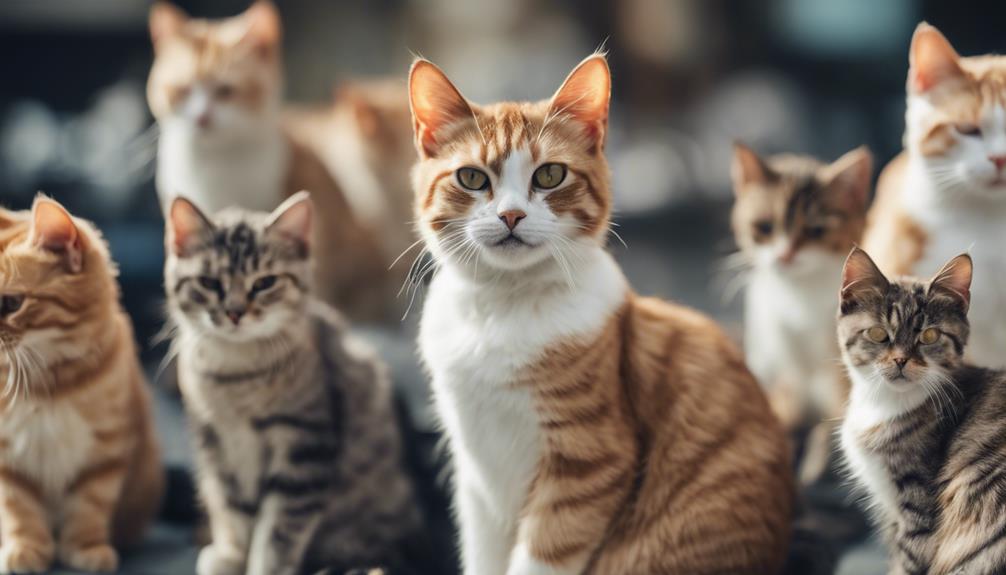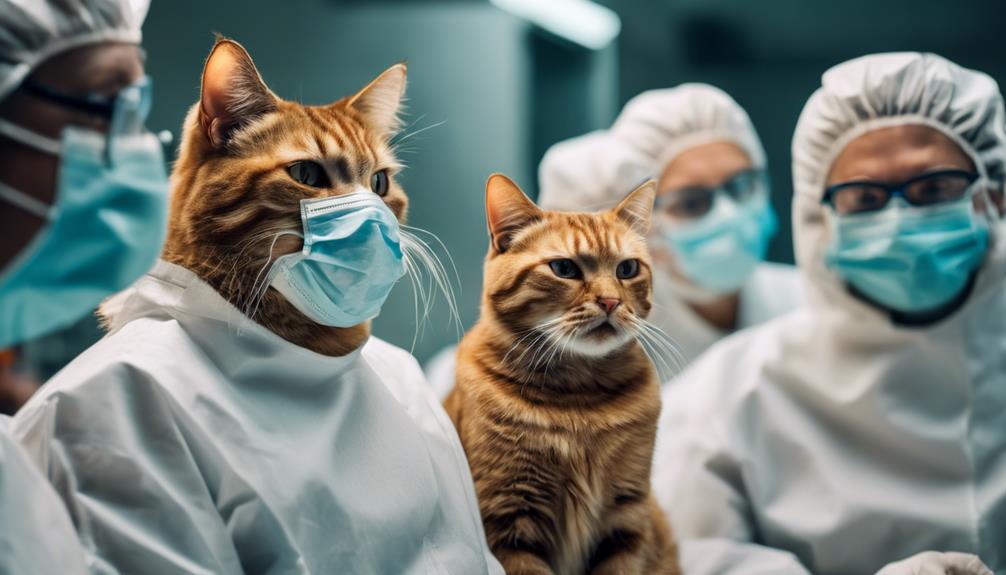Recent revelations in the realm of COVID-19 research have brought to light a concerning possibility – the prevalence of coronavirus in cats may be more widespread than initially presumed. As studies uncover a higher incidence of COVID-19 antibodies in feline companions, questions arise about the implications for both human and animal health.
The implications of these findings on public health strategies and the potential risks associated with the virus's transmission between humans and cats necessitate a closer look. Stay tuned as we explore the evolving landscape of COVID-19 in our feline friends and the critical considerations it brings to the forefront.
Key Takeaways
- Cats can catch COVID-19 from humans, with antibodies found in 14.7% of cats.
- Cats with highest antibody levels were owned by COVID-19 patients.
- Cats showed no symptoms or deaths from the virus.
- Study suggests isolating from pets when diagnosed with COVID-19.
Cats Can Contract COVID-19 From Humans
Cats are susceptible to contracting COVID-19 from humans, as evidenced by a study showing the presence of COVID-19 antibodies in a notable percentage of felines. Research revealed that 14.7% of cats tested positive for these antibodies, with those owned by COVID-19 patients displaying the highest levels. Despite this, infected cats did not exhibit any symptoms or fatalities related to the virus.
To prevent potential transmission, experts recommend isolating from pets when diagnosed with COVID-19. The findings raise concerns about virus spread from humans to animals and emphasize the need for further investigations. Understanding this transmission dynamic is crucial in safeguarding both human and animal health during the ongoing pandemic, highlighting the importance of maintaining strict hygiene practices around pets.
Study Reveals COVID-19 Antibodies in Cats
A recent study unveiled the presence of COVID-19 antibodies in a significant percentage of felines, shedding light on the transmission dynamics between humans and cats. This discovery raises concerns about the potential for cats to act as a reservoir for the virus. The study, which collected blood samples and mucus swabs from 102 cats, revealed that 11 of them had neutralizing antibodies capable of blocking virus infection.
Cats can develop COVID-19 antibodies.
Antibodies in cats may indicate exposure to the virus.
Further research is needed to understand the implications of these findings on human-to-cat transmission dynamics.
Cats Owned by COVID-19 Patients Show High Antibodies

In light of recent research findings, a notable trend has emerged regarding the antibody levels in cats owned by individuals diagnosed with COVID-19. These cats showed significantly high levels of antibodies, with 14.7% of them testing positive.
Among these feline companions, those owned by COVID-19 patients displayed the highest antibody levels, indicating a direct correlation between the virus transmission from humans to their pets. Despite the presence of antibodies, these cats did not exhibit any symptoms or fatalities associated with the virus.
These findings underscore the importance of understanding the potential transmission of COVID-19 between humans and their pets, emphasizing the need for caution and further investigation to prevent the spread of the virus within households.
Cats Exhibit No Symptoms or Deaths
Given the absence of symptoms and fatalities in cats with high COVID-19 antibody levels, these findings highlight a crucial aspect of the virus's impact on feline companions. Cats seem to handle the virus differently compared to humans, showing resilience even when exposed to the infection. This unique response raises intriguing questions about how the virus interacts with the feline immune system.
- Cats with high COVID-19 antibody levels remain asymptomatic.
- No deaths have been reported in cats despite exposure to the virus.
- The resilience of cats to COVID-19 may provide valuable insights into the virus's behavior in different species.
Cats From Various Settings Studied

Studying cats from diverse environments provides valuable insights into the transmission and implications of COVID-19 within different settings. Research involved cats from shelters, hospitals, and homes of COVID-19 patients. Among 102 cats studied, 11 had neutralizing antibodies blocking virus infection. The findings suggest that infections in cats were likely transmitted from humans.
This sheds light on the importance of investigating virus transmission between humans and pets further. Understanding how COVID-19 affects cats in various settings is crucial for developing strategies to manage the spread of the virus. By examining cats from different environments, researchers aim to enhance our knowledge of COVID-19 transmission dynamics and potentially prevent future infections in both animals and humans.
Infections Likely From Human Transmission
Research findings strongly indicate that COVID-19 infections in cats are predominantly a result of transmission from infected humans, highlighting the critical need for further investigation into the dynamics of virus spread between humans and pets. The following points shed light on this concerning issue:
- Cats living with COVID-19 patients showed higher antibody levels.
- Cats in shelters and hospitals also tested positive for the virus.
- Understanding how the virus moves between humans and pets is crucial for protecting our beloved feline companions.
This evidence underscores the importance of taking precautions to prevent the spread of COVID-19 from humans to cats, emphasizing the significance of further research in this area to safeguard the health of both pets and their owners.
Implications for COVID-19 Treatment

The insights gained from studying COVID-19 transmission to cats hold potential implications for enhancing treatment strategies against the virus. Understanding how the virus can affect animals like cats sheds light on potential treatment avenues.
Cats with neutralizing antibodies that block virus infection provide a valuable model for studying immune responses to COVID-19. Research on virus transmission between humans and cats suggests shared pathways that could inform antiviral therapies.
Recommendations for Pet Owners
Pet owners should prioritize stringent hygiene practices and consider isolating from their pets if diagnosed with COVID-19 to minimize potential transmission risks. It is essential to safeguard not only yourself but also your furry companions during these uncertain times. To ensure the well-being of your pets, consider the following recommendations:
- Practice regular handwashing before and after interacting with your pets.
- Avoid sharing food or bedding with your pets to reduce any potential transmission risks.
- If possible, designate a specific area in your home for your pets to limit their exposure to any virus contaminants.
COVID-19 Cases in U.S. Pets

Amid concerns regarding COVID-19 transmission to pets, recent cases in the United States have highlighted the importance of understanding the impact of the virus on companion animals. In the U.S., 17 cats and 15 dogs have tested positive for COVID-19, with one lion and one tiger also contracting the virus. Notably, cats that tested positive for COVID-19 antibodies did not exhibit any symptoms. The Department of Agriculture has confirmed these cases in pets, emphasizing the need for ongoing research on COVID-19 in animals to better comprehend the implications for pet health and transmission dynamics.
| COVID-19 Cases in U.S. Pets | |
|---|---|
| Cats | 17 tested positive |
| Dogs | 15 tested positive |
| Big Cats | 2 tested positive |
Animals Testing Positive for COVID-19
Recent reports have revealed instances of animals testing positive for COVID-19, shedding light on the potential cross-species transmission of the virus. This discovery raises concerns about the implications for both human and animal health.
The following key points highlight the current scenario:
- Dogs, cats, and even big cats like lions and tigers have tested positive for COVID-19.
- Some animals have shown mild symptoms or have been asymptomatic carriers of the virus.
- The confirmed cases indicate the need for further research into understanding the dynamics of COVID-19 transmission among different species.
Confirmations From Department of Agriculture

Confirmations of COVID-19 cases in animals have been officially verified by the Department of Agriculture. The department's acknowledgment of cases in pets sheds light on the potential transmission of the virus among different species. Here is a breakdown of the confirmed cases:
| Animal | Number of Cases |
|---|---|
| Cats | 17 |
| Dogs | 15 |
| Lions | 1 |
| Tigers | 1 |
The Department of Agriculture's confirmation underscores the importance of understanding COVID-19 transmission dynamics in animals. This data serves as a crucial foundation for further research and precautions in managing the spread of the virus among animals and humans.
Ongoing Research on COVID-19 in Animals
Research endeavors focusing on the ongoing investigation of COVID-19 transmission dynamics in animals aim to enhance our understanding of cross-species virus spread. This research, driven by a sense of urgency and importance, delves into various aspects of the virus's interaction with animals. Noteworthy points include:
- Uncovering potential transmission routes between humans and animals.
- Identifying animal species most susceptible to COVID-19.
- Developing strategies to mitigate the risk of viral spread in animal populations.
Such investigations play a crucial role in shaping our response to the pandemic, offering insights that could ultimately aid in safeguarding both human and animal health. The collaborative efforts of researchers worldwide underscore the significance of unraveling the complexities of COVID-19 transmission in animals.
Frequently Asked Questions
How Does the Presence of COVID-19 Antibodies in Cats Impact Their Overall Health and Well-Being?
The presence of COVID-19 antibodies in cats raises concerns about potential virus transmission from humans. Research shows no evident health impacts on cats, but further investigation is crucial to understand the implications on feline well-being.
Are There Any Known Cases of Cats Transmitting COVID-19 Back to Humans?
Research has not confirmed cases of cats transmitting COVID-19 to humans. Studies primarily focus on human-to-animal transmission. While cats can catch the virus from people, current evidence does not suggest a significant risk of cats spreading COVID-19 to humans.
Can Cats Develop Long-Term Immunity to COVID-19 After Being Exposed to the Virus?
Cats exposed to COVID-19 may develop immunity, as shown by antibodies in some cats. Further research is needed to understand long-term immunity in cats. Recommendations include isolating infected cats to prevent potential transmission and advancing COVID-19 management.
What Are the Potential Implications of Cats Being Infected With COVID-19 for the Broader Community?
The potential implications of cats being infected with COVID-19 for the broader community include the need for further research on interspecies transmission, reinforcing hygiene practices around pets, and considering pets in public health strategies.
How Do the Findings of This Study on Cats Contracting COVID-19 Contribute to Our Understanding of the Virus and Its Transmission Dynamics?
The recent study on cats contracting COVID-19 sheds light on virus transmission dynamics between humans and animals. Understanding how the virus affects pets can enhance our knowledge of its spread and help in implementing effective prevention strategies.
Can Cats Transmit Coronavirus to Humans if They Haven’t Been Vaccinated for Rabies?
Yes, cats can potentially transmit coronavirus to humans if they haven’t been vaccinated for rabies. It’s important to ensure that your cats receive the rabies vaccine for cats to reduce the risk of transmission of diseases to humans.
Conclusion
In conclusion, the research on COVID-19 transmission to domestic cats has revealed a higher prevalence of antibodies than initially expected. Cats can contract the virus from humans, with those owned by COVID-19 patients showing elevated antibodies. Despite exhibiting no symptoms or deaths, the implications of COVID-19 in cats are significant.
Ongoing research and monitoring are essential to understanding the dynamics of virus transmission between humans and feline companions, informing public health strategies and safeguarding animal welfare.




